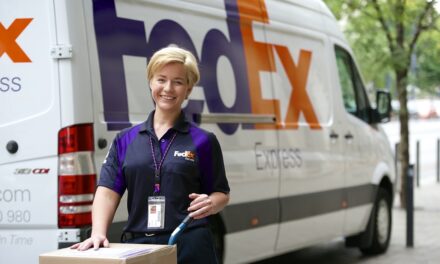
Why the third party route brings mutual benefits
Amid all the talk in the past couple of years moving into thirdpay6j fulfilment, it's been easy to ignore one that got there ahead of the game.
Business Express, the Littlewoods group subsidiary, bpened its doors to outside customers many years ag Rem arkably, until recently it had more than a thousand of them on its books. Third-party business was (and is) very much a part of its long-term game plan.
In part, it achieved this market presence by adopting a highly focused approach to its business. “Our real skill is taking the product the final mile.” That’s how managing director Mick Janicki sums it up. “We aim to get the end customer to enjoy home shopping.”
To this extent, you might see Business Express as more a parcels carrier than an all-in fulfilment company. Indeed, Janicki says that among home delivery specialists it is third only to Consignia in volume terms — “and that’s a position we’re quite happy to be in.”
That means the company can quote some seriously large numbers to sum up its scale. It has 33 depots and 2,500 delivery vehicles, and handles 170,000 items on a typical night, rising to 400,000 during the December peak.
Its offer does, however, extend well beyond deliveries alone, including resources such as call centre management. “Where it makes sense in volume terms, we’re happy to offer warehousing, picking and packing and other services,” Janicki says. “We would work with partner companies, either within the Littlewoods group or outside it.”
He turns out to be a great advocate of the
partnering concept.”We certainly take that approach with our customers,” he says. “We look for mutual gains and benefits. So we might help customers organise their warehousing or credit control. Operations need to be planned and ready in advance, and we aim to bring energy and enthusiasm to the process.”
That said, it is in the core service of parcels processing and delivering that Business Express really excels. And that expertise was taken to a new level last summer, when the company opened a giant new automated sortation centre at its main hub in Shaw, Oldham.The overall cost, including a feeder operation collating product from an adjacent Littlewoods warehouse, was a mammoth £58 million.
This centre now serves as a national hub for the company, and the focal point for an intricate set of trunk movements linking it with all the depots. And the company isn’t planning to stop here. “We’re handling 65 million packages a year now, and this centre can take up to 82 million," Janicki says. “By then we’ll need extra capacity.”
The most likely solution, he says, will be to build or acquire a second hub in the Midlands; and he leaves no doubt that such expansion will come. Under the current three-year plan, Business Express will boost throughput to 87 million packages — well above present capacity.
Under the microscope
However, despite planned growth in third-party business, the actual number of outside customers served by the company has been reduced quite radically in the last few years. When Janicki joined in 1999, he found there were many quite small accounts that were difficult to service profitably. “We were handling everything from trees and shrubs to lobsters,” he says. “So we put every commercial contract under the microscope.”
As a result, the portfolio has been reduced to 250 much bigger accounts, “and we might even reduce it further.” The remaining customers are “regular shippers” moving high volumes of products that are well suited to Business Express resources.
Janicki is by no means prescriptive about what kind of traffic is most appropriate, but mentions items such as bagged clothing,telecoms equipment, books and CDs as particularly compatible.
“We aim to offer the highest possible quality of service,” Janicki says, “and we need to be sure the product allows us to achieve that.”
Other product areas also offer interesting opportunities, he says. One that he singles out is wine home deliveries. Paradoxically, the company was previously quite active in this sector, but then almost pulled out of it. "If you’re not careful,you can make money for nine months and lose it in the next three,” Mick Janickici says with irony.
However, he has maintained wine delivery operations for two key customers —Waitrose and Wines Direct — and sees growth opportunities in a more focused approach. “There are definite attractions in a dedicated wine delivery network,”he says. Watch this space.
24-hour service
In terms of service levels, Janicki is keen to dispel any myth that the company might be constrained by old catalogue shopping practices. “People sometimes think we standardise on a 48-hour service, but that’s not true. We offer a 24-hour service for a large number
of our third-party accounts.’ He says that includes work for Lands’ End, one of the company’s flagship contracts, which was recently extended when Business Express took over a tranche of work still handled by Consignia.
Business Express itself arranges collection of product from many of its third-party customers, which helps to maintain tight timings. “Some of them presort the product by depot, which can be particularly useful for next-day deliveries.” In a move to speed up the process even further, the company has recently been running trials with bigger customers involving linehaul deliveries direct to local sites. Depending on the success of this move, it could be extended nationwide over the next few months.
The company is also constantly looking at ways of enhancing its service levels. When we visited its Shaw sortation centre the company was planning to
introduce Saturday deliveries —“and I'm talking about a full am-pm offer,” Janicki emphasises. “We’re considering Saturday as a full sixth delivery day. No one is doing this yet.”
He was also close to announcing a deal to offer a nationwide network of consumer drop-off points. “We see our job as delivering product where and when the customer wants it,” he says, adding: “We didn’t want to start the service on a trial basis, we wanted something that was fully-fledged from day one.”
He admits frankly that its success can’t be guaranteed. “If you’re asking me whether the idea will really take off, the answer is that we don’t know yet. End users haven’t declared themselves. But at least we’ll be offering the best option we can.”
Some appeal
He agrees that drop-boxes outside customers’ houses also have some appeal, but feels that the setup and administration costs militate against them.”And in any case, we have quite a low delivery failure rate.” Why is that? “We go further to complete the delivery," he says. “It might be through leaving the item with a neighbour, or simply knowing the best time to deliver.”
Indeed, within two years the company has succeeded in reducing that failure rate to about a quarter of the previous figure — currently around 3.5 per cent. “But London is always the problem area,” he says, adding that the failure rate there is around 6 per
cent, Clearly this is one area where the drop-point system could bring significant gains.
A measure that should offer equal attraction for customers and home shoppers themselves is a comprehensive £8 million track and trace system, which monitors product movement from collection to picking and packing, depot, delivery van and frontdoor deliveiy
The main system behind this runs on two Sun computers at Littlewoods’ Liverpool headquarters (see panel on opposite page). It was written using Oracle tools by Symbol, which also supplied the handheld terminals and scanners for the system.
Despite the significant volumes of third-party business now handled by Business Express, this still accounts for only 17 per cent of the company’s business. The rest is for the Littlewoods parent. But Janicki says he would like to increase it to about 30 per cent for outside customers — possibly even more.
The measures take by Janicki and his team are clearly paying off already, both for Littlewoods and for third-party customers. He has already turned a lossmaking situation into a profitable one, and in terms of value, he says the current three-year plan envisages doubling the company’s commercial income and trebling profits. When asked how, he answers in a single word: “Flexibility” adding that this means doing what customers want in a way that brings mutual benefits. “That way we’re all winners.”













